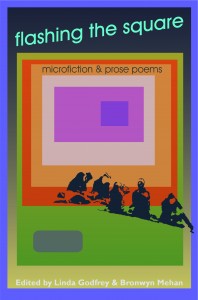
To celebrate MicroLit Month, we bring you interviews with Flashing The Square authors. Today we feature, Ruth Wyer whose piece, ‘I Don’t Use My Powers For Good’ you can listen to below.
1. What inspired you to write the prose poem/microfiction which will appear in Flashing the Square?
I commute 3 hours a day and am constantly flabbergasted by just how rude and inconsiderate people can be on public transport. I once wrote a long email rant about it to a friend on my way home. Months later, I was having a conversation with colleagues at work and we were talking about what our secret superpower wish would be and I said mine was to stop time so I could take revenge on all these people who drive me crazy every day. Everyone else had these other great super power wishes but, unlike me, they wanted them so they could do fun, adventurous things. I thought back to what I’d written to my friend months before and I thought ‘Wow! I am really mean and petty!’ I had most of the story right there.
2. Tell us about your process. (Do you start sparse and widen out, or do you write down every possible association and cut back? Do you research the subject matter you are writing about? Is it pure intuition?) Take us through an example if you want.
Most of my stories start from a single line, usually the first line. I do much of my writing in my head so I wait until a first line comes to me before I start writing. I get down whatever comes out (usually it’s only one or two hundred words, sometimes less. One memorable time I wrote an entire 1000 word story in 20 minutes but it sadly never happened again) then I put it away. The only reason I leave it is because I’ve learnt that if I try and force anything out that’s not ready to come it’s just a waste of time. I have several things on the go and I keep going back to them and tinkering and adding little bits until something starts to click and I think ‘Ah! That’s where this story is going’. Most of my stories naturally fall under 1000 words because I tend to write them around a single event rather than following a plot. It’s only in the process of writing more into them, in order to fix what I think is not working, that I end up with longer pieces. I write very sparsely and the only time I ever cut back is, say, if I end up with 2550 words and I am submitting to a 2500 limit. I find it hard to cut back because the words have been added so slowly over a long period but it’s also one of the parts of writing I most enjoy; that last piece of the puzzle where I have to find a way to say the same thing but in less words. That’s why I love flash fiction. Dropping 50 words off a 250 word story is extremely challenging. As for research, if my story is based in 1976 and I talk about a green rotary phone or the exact words etched into the vinyl of a specific record then I will do research to make sure those things were around in that exact year. I probably spend far too long researching little things like that but I do it because it’s fun. And I want writing to be fun.
3. What advice do you have for other writers? (About the first or last line? About how to choose the title? Do you follow any rules?)
There are only three things that come easily to me when writing and that’s the first line, the last line and the title. Because it’s such a stark contrast to the way I write the rest of the story (painstakingly) I don’t ever mess with these three things so the only rule I follow is not to force them and not to second guess them. I realise that’s not much help to anyone else so my advice to others is based on what I like in a short story:
– Have a strong opening line. Grab the reader and drop them straight into the action
– Don’t be vague with your last line. We don’t want a cheesy or clichéd twist but nor do we want to invest time and emotion in a story that ends up in the air. It’s a slap in the face.
– Don’t be lazy with your titles. They set the tone for the story and are the bait on the hook of your first line.
4. Who or what inspires your writing?
I’m inspired: by real life events or random lines that come into my head; by international writers, yes, of course, but mostly by people writing in Australia at the moment; by people like Robert Skinner who speak so eloquently and passionately about stories; when I discover a writer for the first time (Ryan O’Neill, Pierz Newton-John) and almost can’t wait until the end of the story to track down their collections; by stories like A.S Patric’s ‘Bombs’ or Penelope Chai’s ‘Ways to Avoid Saying Sorry’ that make me cry every time I read them (yes, every time); when I read a story like Jack Vening’s ‘The Past Lives of Robert Redford’ and grin in delight for the entire time; when I read a story with the energy of J.Y.L. Koh’s ‘Two’ and I have to take a break afterwards because I’ve just been sucked up, spun around and spat back out and need time to recover (and isn’t that what a story should do to you?). Stories like these, and there are so many more, make me want to strive harder to move or surprise people with my own writing.
5. Tell us what you do if you haven’t written anything in a while and you want to get started writing again? Could you share your favourite writing exercise with our readers?
I haven’t found a writing exercise that works for me yet but I do need to find one. To get motivated I revisit a story I’ve left for a while and try to revive it, maybe by changing the tense or the gender of the protagonist, or I reread stories by others that I love but haven’t read in ages. Nothing motivates me more than reading a fabulous story and thinking ‘I want to write something as great as that’.
